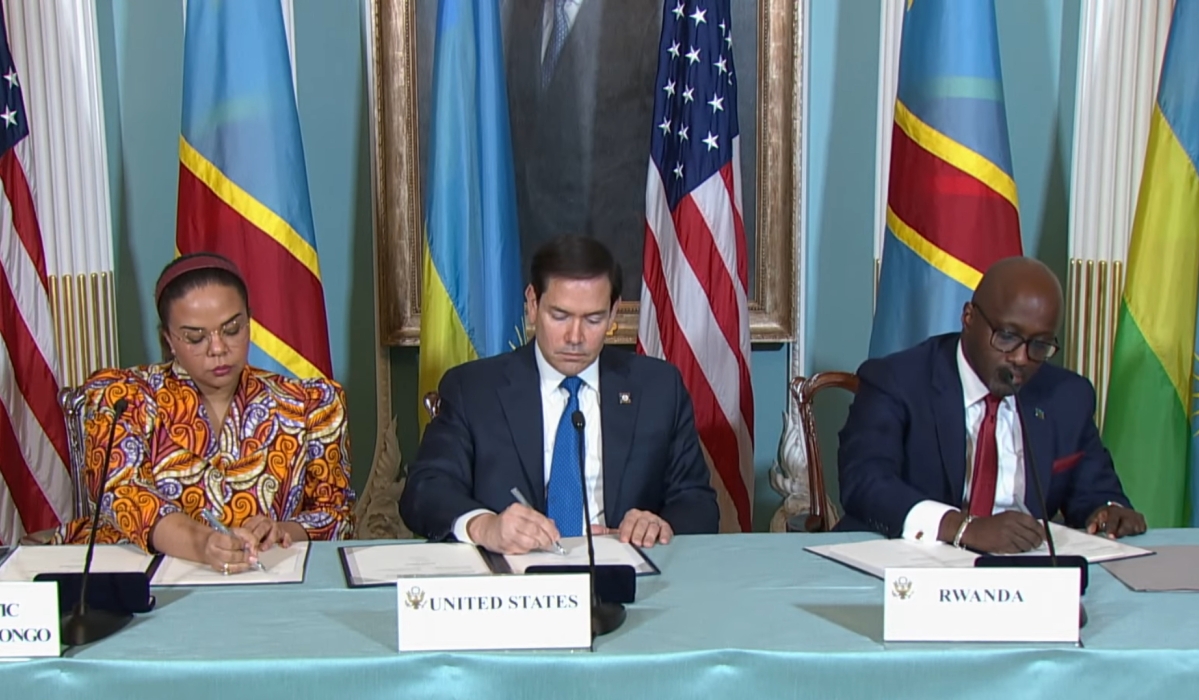
Nduhungirehe: Washington’s announcement “opens door to peace” in the Democratic Republic of the Congo
Rwandan Minister of Foreign Affairs and International Cooperation Olivier Nduhungirehe stated that the principles agreement between Rwanda and the Democratic Republic of the Congo, which was signed in Washington, D.C., on Friday, April 25, “opens the door” to a deal that will bring about enduring peace in the Great Lakes Region and eastern DR Congo.
In a ceremony marked by US Secretary of State Marco Rubio, Nduhungirehe and his Congolese colleague Therese Kayikwamba Wagner signed the deal.
The signing of the US-facilitated statement of principles, according to Nduhungirehe, aims to resolve enduring problems that have fueled war in eastern DR Congo and have an impact on the larger region.
But he cautioned that “shortcuts or quick fixes” wouldn’t eradicate decades of instability.
In order to establish a sustainable peace in our region, Nduhungirehe stated during the signing, “Today, we are talking about the real issues, the root causes that must be addressed.”
Security and refugee repatriation are the two most important of these. Importantly, we are also talking about ways to connect our nations through new regional economic value chains, particularly through private sector investment from the United States.
The cooperation between the FDLR, a US-sanctioned militia established by the perpetrators of the 1994 Genocide against the Tutsi, and the DR Congo has long been a source of concern for Rwanda.
The organization targets the Tutsi communities in Congo with hate speech and acts of genocidal violence. Nearly 100,000 Congolese have fled conflict and are now living in Rwanda; others have been in camps for more than 25 years.
A Congolese government coalition fighting the AFC/M23 rebels has also raised worries about Rwanda’s government’s hostile intentions.
The rebels, who have seized two important cities in eastern DR Congo since January, are accused by DR Congo of receiving backing from Rwanda. These accusations are denied by Rwanda, which notes that government implemented defensive steps to stop the security risks from materializing.
Massad Boulos, the Senior Advisor for Africa under US President Donald Trump, met with Presidents Felix Tshisekedi and Paul Kagame ten days before to the signing of the statement of principles for peace.
In a region that has been unstable for thirty years, Nduhungirehe praised the US government’s efforts to promote a peaceful settlement of the war in eastern DR Congo.
“A secure, well-governed region free from violent ethnic extremism is our goal,” he stated.
He went on to say that the declaration of principles “opens the door to a definitive peace agreement, giving fresh impetus” to the current peace talks mediated by Qatar and the African-led process under the East African Community and Southern African Development Community.
In their first direct talks in the three years of the fighting, the Congolese government and the AFC/M23 rebels announced Wednesday they had reached a ceasefire agreement, thanks to the mediation of Qatar.
“Coming to a comprehensive peace agreement as soon as possible is our shared goal,” Nduhungirehe stated.
“But we must put in the effort to do it correctly, once and for all, and there are no short cuts or quick fixes.”
He said that in order to guarantee the success of the US-facilitated project, Rwanda was prepared and dedicated to continue collaborating with all of the partners.
The statement of principles, according to Secretary Rubio, created “a fundamental understanding of regional governance, security, economic frameworks, and to end the fighting and allow the region to reach its full potential.”
“It shows a strong commitment to having the conversations we need to have in order to reach a resolution that both of my counterparts, the foreign ministers of these respective countries, are here,” he said.
US investment interests benefit from a tranquil Great Lakes Region, he continued. Important mining agreements with Rwanda and the Democratic Republic of the Congo are being pursued by the US administration.
“Economic development comes after lasting peace,” Rubio stated. You can’t function without the tranquility. Additionally, it will provide millions of displaced people with new economic opportunities that have eluded generations and enable them to return to safer areas and their homes.
All Categories
Recent Posts
Tags
+13162306000
zoneyetu@yahoo.com



